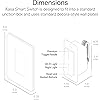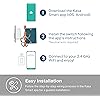







Ready to go? Add this product to your cart and select a plan during checkout. Payment plans are offered through our trusted finance partners Klarna, PayTomorrow, Affirm, Afterpay, Apple Pay, and PayPal. No-credit-needed leasing options through Acima may also be available at checkout.
Learn more about financing & leasing here.
This item is eligible for return within 30 days of receipt
To qualify for a full refund, items must be returned in their original, unused condition. If an item is returned in a used, damaged, or materially different state, you may be granted a partial refund.
To initiate a return, please visit our Returns Center.
View our full returns policy here.
Style: Single Pole
Features
Description
Control your lights, ceiling fans, and other fixtures from anywhere with the HS200. The smart switch replaces any standard light switch, and connects to your home Wi-Fi in no time through the free Kasa app. Kasa also lets you manage connected fixtures with your smartphone or tablet, including setting schedules, timers and countdowns. For added convenience, you can use your voice to control the HS200 when paired with works with Amazon Alexa, Google assistant and Microsoft cortana.Input Voltage: 100 - 120 VAC, 50/60 Hz, 15 A.
Is Discontinued By Manufacturer : No
Product Dimensions : 1.5 x 3.3 x 5 inches; 5.28 Ounces
Item model number : HS200
Date First Available : June 1, 2016
Manufacturer : TP-LINK USA
Country of Origin : Vietnam
Best Sellers Rank: #516 in Tools & Home Improvement (See Top 100 in Tools & Home Improvement) #1 in Ceiling Fan Wall Controls #2 in Electrical Light Switches
#1 in Ceiling Fan Wall Controls:
#2 in Electrical Light Switches: